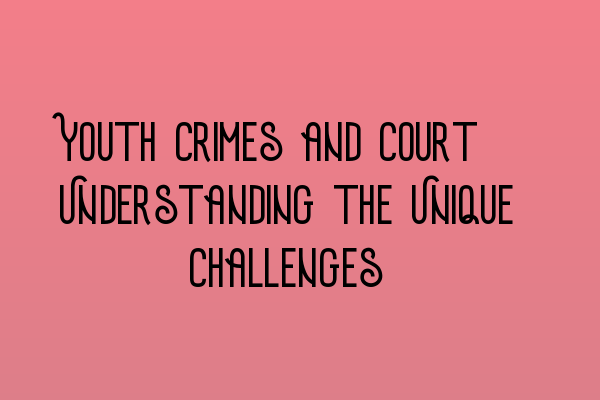Youth Crimes and Court: Understanding the Unique Challenges
Welcome to the SQE Criminal Law & Practice Law UK blog, where we delve into the realm of criminal law and provide insightful information for aspiring solicitors and legal professionals. In this article, we will be discussing the unique challenges surrounding youth crimes and their trials in court.
The Impact of Youth Crimes
Youth crimes refer to criminal activities committed by individuals under the age of 18. These crimes can range from minor offences, such as shoplifting, to more serious offences like assault or drug-related crimes.
The impact of youth crimes on both individuals and society as a whole is significant. These crimes can have long-lasting effects on the lives of young offenders, as they may face difficulties in education, employment, and personal relationships. Additionally, youth crimes put a strain on the criminal justice system, as courts and other legal entities strive to provide appropriate resolutions for these individuals.
The Unique Challenges of Youth Crimes Trials
When it comes to prosecuting and defending youth crimes cases, there are several unique challenges that legal professionals must navigate. It is important for solicitors to understand these challenges in order to ensure fair and just outcomes for young offenders.
1. Age and Maturity
The age and maturity of young offenders play a crucial role in their trials. It is essential for solicitors to consider the developmental stage of the accused and tailor their approach accordingly. Recognizing the potential for rehabilitation and encouraging positive change are instrumental in helping young offenders reintegrate into society.
2. Rehabilitation vs Punishment
One of the primary goals of the criminal justice system is to strike a balance between rehabilitation and punishment. When dealing with youth crimes, this balance becomes even more crucial. Legal professionals must advocate for sentences that aim to rehabilitate young offenders, providing them with the tools and resources to turn their lives around.
3. Confidentiality and Privacy
Protecting the confidentiality and privacy of young offenders is of utmost importance. The law ensures that their identities are often withheld to prevent stigmatization and preserve their future prospects. Solicitors should be well-versed in the legal procedures surrounding anonymity to safeguard their clients’ rights.
4. Restorative Justice
Restorative justice approaches can be particularly effective in youth crimes cases. Encouraging dialogue between young offenders, victims, and their communities fosters a greater understanding of the consequences of one’s actions. Legal professionals should explore the potential for restorative justice practices as an alternative to traditional sentencing methods.
Conclusion
Understanding the unique challenges surrounding youth crimes and their trials is essential for solicitors practicing in criminal law. By taking into account the age and maturity of young offenders, advocating for rehabilitation, safeguarding confidentiality, and exploring restorative justice alternatives, legal professionals can contribute to the fair and just resolution of youth crimes cases.
We hope you found this article informative. If you are interested in furthering your legal knowledge and preparing for the SQE exams, be sure to check out our related articles:
- SQE 1 Practice Exam Questions
- SQE 1 Practice Mocks FLK1 FLK2
- SQE 2 Preparation Courses
- SQE 1 Preparation Courses
- SRA SQE Exam Dates
